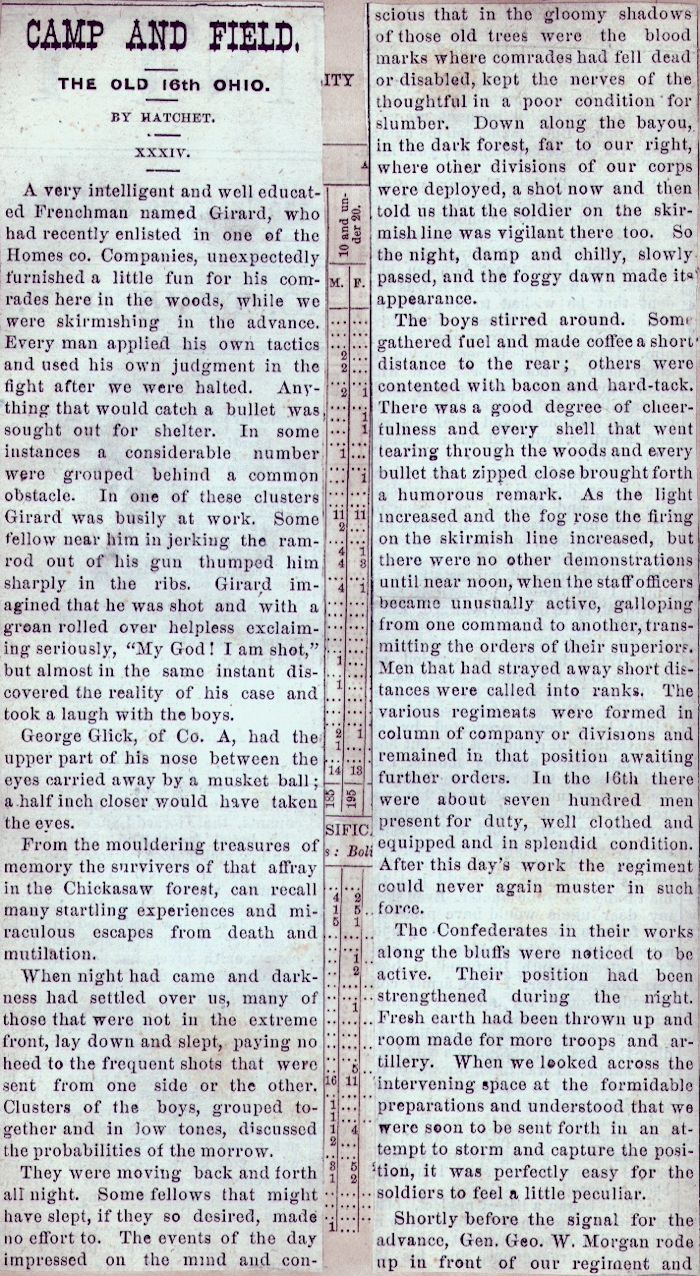| Camp & Field Page 53B | Camp & Field Index Page | 16th OVI Home Page | Camp & Field Page 55 |
The Camp & FieldArticles by Theodore Wolbach |
 Cpl. Theodore D. Wolbach |
The following image is taken from a book titled "Mortality and Statistics of the Census of 1850" in which it is believed retired Captain Rezin H. Vorhes, Company H, pasted over the pages a series of articles written by Cpl. Theodore D. Wolbach, Company E, titled "Camp and Field" and published, by chapter, in the Holmes County (Ohio) Republican newspaper from February 24, 1881 to August 17, 1882. The articles tell the story, in great detail and color, of the 16th OVI, from the inception of the 3-year regiment in October, 1861, through all its camps, battles and marches until it was disbanded on October 31, 1864. The articles pasted in the Vorhes book cover the first 35 chapters, published through October 20, 1881. All the remaining chapters were recently found in a Holmes County library by researcher Rob Garber who obtained copies, performed the transcriptions and provided to this website and which are also presented here, thus providing the complete work by Theodore Wolbach.
Throughout these articles click on the underlined white text for additional details.
The webauthor thanks 16th Ohio descendant Rob Garber for his excellent research on the Camp And Field articles and for performing the tedious digital transcription of those articles found on each page. The transcriptions were made to reflect the original articles verbatim, misspellings and all. Rob is the 3rd great nephew of Capt. William Buchanan, Company F, 16th Ohio, who served in the 90-day regiment as a private, re-enlisting in the three year regiment, and eventually making the rank of Captain of Company F. Thanks Rob!
Page 54 - Chapter 34 - December, 1862
 |
Published in Holmes County Republican XXXIV. A very intelligent and well educated Frenchman named Girard, who had recently enlisted in one of the Homes [sic] co. Companies, unexpectedly furnished a little fun for his comrades here in the woods, while we were skirmishing in the advance. Every man applied his own tactics and used his own judgment in the fight after we were halted. Anything that would catch a bullet was sought out for shelter. In some instances a considerable number were grouped behind a common obstacle. In one of these clusters Girard was busily at work. Some fellow near him in jerking the ramrod out of his gun thumped him sharply in the ribs. Girard imagined that he was shot and with a groan rolled over helpless exclaiming seriously, George Glick, of Co. A, had the upper part of his nose between the eyes carried away by a musket ball; a half inch closer would have taken the eyes. From the mouldering treasures of memory the survivers [sic] of that affray in the Chickasaw forest, can recall many startling experiences and miraculous escapes from death and mutilation. When night had come and darkness had settled over us, many of us that were not in the extreme front, lay down and slept, paying no heed to the frequent shots that were sent from one side or the other. Clusters of the boys, grouped together and in low tones, discussed the probabilities of the morrow. They were moving back and forth all night. Some fellows that might have slept, if they so desired, made no effort to. The events of the day impressed on the mind and con- |
conscious that in the gloomy shadows of those old trees were the blood marks where comrades had fell dead or disabled, kept the nerves of the thoughtful in a poor condition for slumber. Down along the bayou, in the dark forest, far to our right, where other divisions of our corps were deployed, a shot now and then told us that the soldier on the skirmish line was vigilant there too. So the night, damp and chilly, slowly passed, and the foggy dawn made its appearance. The boys stirred around. Some gathered fuel and made coffee a short distance to the rear; others were contented with bacon and hard-tack. There was a good degree of cheerfulness and every shell that went tearing through the woods and every bullet that zipped close brought forth a humorous remark. As the light increased and the fog rose the firing on the skirmish line increased, but there were no other demonstrations until near noon, when the staff officers became unusually active, galloping from one command to another, transmitting the orders of their superiors. Men that had strayed away short distances were called into ranks. The various regiments were formed in column of company or divisions and remained in that position awaiting further orders. In the 16th there were about seven hundred men present for duty, well clothed and equipped and in splendid condition. After this day's work the regiment could never again muster in such force. The Confederates in their works along the bluffs were noticed to be active. Their position had been strengthened during the night. Fresh earth had been thrown up and room made for more troops and artillery. When we looked across the intervening space at the formidable preparations and understood that we were soon to be sent forth in an attempt to storm and capture the position, it was perfectly easy for the soldiers to feel a little peculiar. Shortly before the signal for the advance, Gen. Geo. W. Morgan rode up in front of our regiment and |
| Camp & Field Page 53B | Camp & Field Index Page | 16th OVI Home Page | Camp & Field Page 55 |